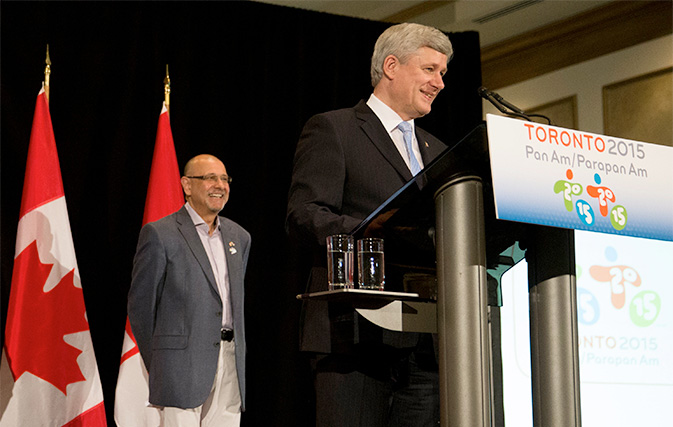PANAMA CITY — Stephen Harper emerged from a meeting with Cuba’s Raul Castro with a call for more engagement with the island nation, signalling a change of heart for the prime minister when it comes to the communist regime.
The leaders’ conversation Saturday at the Summit of the Americas in Panama followed a brief greeting and handshake at a photo-op.
“I have become convinced that a different approach is appropriate at this point in time,” Harper told reporters in Panama City shortly after meeting Castro.
“We’re at a point where an engagement is more likely to lead us to where want to go than continued isolation.”
It’s a different approach than the one Harper has taken with Cuba in the past.
Harper, who has had strong words about the communist regime, initially opposed inviting Cuba to this year’s summit because it was not a democracy. He has also been a vocal critic of communism.
He revealed that his views changed, at least in part, after the United States began contemplating a different approach to its relationship with Cuba.
Harper, however, was careful Saturday to point out that more work is necessary on the Caribbean island.
“We are not by any means unconcerned about the lack of democratic space and human-rights abuses in Cuba,” he told reporters.
“We’ve always been clear on that and we will continue to be clear on that.”
During the their conversation, Harper said he and Castro discussed the long-running relationship between their countries — on political, tourism and commercial levels.
The prime minister, who also noted how Canada helped facilitate the December deal between the U.S. and Cuba to work toward normalizing their diplomatic relations, gave little additional information about his own chat with Castro or how long it lasted.
“We had a good and long discussion with the president,” said Harper, who had never met Castro.
The Castro-Harper discussion was overshadowed by the Cuban leader’s meeting earlier in the day with U.S. President Barack Obama. It was the first formal, face-to-face talks between American and Cuban leaders in more than half a century.
Obama and Castro sat side by side in a conference room in a bid to inject fresh momentum into their effort to restore diplomatic ties.
Castro told Obama he was ready discuss sensitive issues including human rights and freedom of the press, saying, “everything can be on the table.” But he also cautioned that the two countries have “agreed to disagree.”
For years, the Cuba issue overtook discussions at the Summit of the Americas, which it had never been invited to since the gatherings first started in 1994. They are held every three years.
In 2012, Canada and the U.S. were the only two member countries to oppose Cuba’s invitation to this year’s summit. They faced criticism from other hemispheric leaders for leaving the Cubans out.
On Saturday, Harper reminded his counterparts in a speech how Canada’s played a role facilitating negotiations between the U.S. and Cuba by providing venues for their high-level talks.
“We also are pleased that all the countries of the hemisphere are represented here,” Harper said in his five-minute address to the summit.
The remarks mark a shift for Harper, a man who has railed against communism.
Last year, Harper called communism a “poisonous ideology” with “ruthless practices that slowly bled into countries around the world, on almost every continent.”
He made the comments in a speech at a Toronto fundraiser for a controversial victims of communism memorial that will be erected in Ottawa.
On Saturday, Harper’s address was mostly dedicated to outlining his government’s goals for the hemisphere, including the promotion of human rights, security and prosperity.
The prime minister told fellow political leaders that democracy is growing in the Americas as never before.
Harper insisted, however, that more effort was needed to build on the progress.
He also used the summit to build bridges — or mend fences — with regional leaders in one-on-one talks.
On Saturday, Harper met with Obama, who has a strained relationship with Ottawa following his opposition to the Keystone XL pipeline. Canada has also had a chillier friendship with Mexico ever since it tightened visa requirements for Mexican visitors.
A spokeswoman for the Prime Minister’s Office said Harper and Obama discussed the Trans-Pacific Partnership, climate change and security, among other issues.
Harper hosted a reception Saturday night to promote this summer’s Pan Am and Parapan Am Game, which will be held in the Toronto area.
